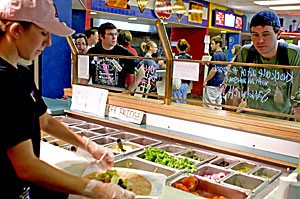It’s for a good reason: The Food and Drug Administration sent out a warning more than a week ago telling Americans not to eat any fresh, raw spinach – the kind served in most salads – because of an outbreak of potentially fatal E. coli bacteria.
The Cactus Grill decided to return all of its fresh spinach, an item that was popular among students, after the announcement Sept. 14, said Louis Andrade, a restaurant supervisor.
Cactus Grill still served the vegetable in its hot-food service line Thursday, but Andrade said complaints from a handful of student forced his staff to rethink the decision.
Andrade said the spinach used in the hot-food line is frozen and not fresh before his staff cooks it, so the FDA warning does not apply.
However, Andrade said the number of worried students was enough to warrant a change in plans.
“”There’s still that doubt in people’s mind that (infection) could still happen, so we won’t be running it again after today,”” Andrade said Thursday.
One person has died from E. coli poisoning and authorities are investigating two other deaths in connection with the outbreak, according to The Associated Press.
Since last month, 171 people have been sickened with E. coli from fresh spinach, the AP reported. Five of those cases were in Arizona, according to a press release from the state’s Department of Health Services.
Arnold Figueroa, a lead employee at IQ Fresh in the Student Union Memorial Center, said his restaurant threw out its supply of fresh spinach and has no plans to order any more.
Figueroa said students now have the choice to order their food using lettuce as a substitute for spinach or to order no leafy vegetables at all.
Kim Dehueck, a junior majoring in Spanish, said she was very worried the day she heard the FDA’s warning because she is a vegetarian and had eaten spinach two nights before.
Dehueck said she threw out all of her fresh vegetables when she heard the news. While she has eaten vegetables since, she said it might be a while until she has any spinach.
“”I don’t eat meat, so I usually don’t worry about getting food poisoning of any kind,”” Dehueck said.
Dr. Sean Elliott, a pediatric infectious disease specialist at the UA College of Medicine, said he was not surprised to hear about an E. coli contamination in a vegetable.
The strain of E. coli found in this outbreak is more common than it should be in farming irrigation water, the doctor said.
Elliott said he is worried about continued poisoning from contaminated spinach.
“”We’ve probably not seen the end of this one,”” Elliott said.
Elliott said the symptoms of E. coli poisoning begin with what seems like a regular bout of diarrhea.
The diarrhea then becomes “”grossly bloody,”” after which the infection might spread to the person’s kidneys, the doctor said.
If the infection is serious enough, the person’s kidneys might fail, eventually leading to death.
Elliott said that between 30 percent and 40 percent of untreated infections are fatal, but people who seek medical attention have a better chance of survival.
Canned or frozen spinach are still OK to eat, Elliott said, but it would be best to get rid of the refrigerated, fresh variety found in salads and assorted bags from the grocery store.









